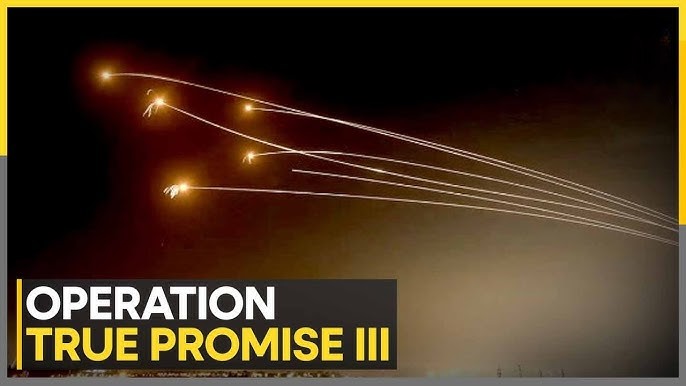Iran Retaliates Against Israel With Operation True Promise 3: What It Means for the Middle East and the World
By: Javid Amin | 14 June 2025
A Dangerous New Phase Unfolds
The Middle East is once again on the brink of a wider war.
On June 14, 2025, Iran launched a massive and coordinated retaliatory military campaign, dubbed “Operation True Promise 3,” in response to Israel’s earlier preemptive airstrikes under “Operation Rising Lion.” The operation marks a dangerous shift from covert tensions to open warfare, shaking the entire geopolitical fabric of the region.
As the world watched in shock, hundreds of Iranian ballistic missiles and drones rained down on Israeli cities and military infrastructure. In turn, Israel’s Iron Dome defense system scrambled to intercept the unprecedented barrage, while sirens wailed from Tel Aviv to Jerusalem.
The conflict—already deadly—is now poised to spill across borders, drawing in powerful players and potentially igniting a catastrophic regional war.
Inside Operation True Promise 3 – Iran’s Retaliation Unleashed
The Strike: Drones, Missiles, and the Religious Symbolism of War
Just after midnight, Iran’s Islamic Revolutionary Guard Corps (IRGC) launched hundreds of ballistic missiles, cruise missiles, and armed drones toward Israel in a highly choreographed assault. The campaign targeted key Israeli defense assets, including:
-
Airbases in the Negev and Galilee
-
Naval facilities in Haifa and Eilat
-
Strategic command centers
-
Urban districts in Tel Aviv, Ramat Gan, and Jerusalem
What stunned analysts was the religious symbolism tied to the timing. Iran chose the night of Eid al-Ghadir, a holy occasion for Shia Muslims, invoking the rallying cry “Ya Ali ibn Abi Talib!” as the assault began.
This was more than just retaliation—it was a calculated message of ideological defiance and divine legitimacy, packaged as military might.
The Human Toll: Death, Panic, and Sirens in the Night
While Israel’s advanced Iron Dome system intercepted many incoming threats, it could not stop all. Reports confirmed:
-
At least one civilian death in Ramat Gan
-
Over 40 injured, including several in critical condition
-
Widespread panic, power outages, and fires in parts of Tel Aviv and southern Israel
Hospitals across central Israel declared a state of emergency, with trauma units activated and emergency shelters overwhelmed.
What Triggered the Conflict? The Road to Retaliation
Israel’s Operation Rising Lion – The First Blow
This spiral of violence began on June 13, when Israel launched Operation Rising Lion, a daring and sweeping offensive inside Iranian territory.
In that operation:
-
Over 200 Israeli aircraft struck 100+ sites across Tehran, Isfahan, and Natanz
-
Key nuclear facilities, missile production plants, and IRGC headquarters were targeted
-
High-profile assassinations occurred, including:
-
IRGC Chief Hossein Salami
-
Armed Forces Chief Mohammad Bagheri
-
Two top nuclear scientists
-
Israel claimed these attacks were necessary to stop Iran from imminently weaponizing enriched uranium—a red line for Tel Aviv.
Iran, however, saw it differently. The strikes were described by Tehran as a “blatant act of war” and a “violation of sovereignty”, prompting immediate vows of vengeance.
Intelligence and Covert Ops: The Role of Mossad and Internal Sabotage
Prior to the Israeli assault, intelligence reports revealed that Mossad operatives had smuggled strike drones and weapon systems into Iran using covert networks and underground bases.
Iranian officials later admitted that air defense systems had been compromised, possibly by inside actors or cyberwarfare—a development that embarrassed the Islamic Republic and galvanized a retaliatory resolve.
Global Shockwaves – The World Reacts
China: “Grave Consequences Await”
China, a key Iranian ally and economic partner, issued a sharp condemnation of Israel’s actions, calling them:
“A violation of international law and Iran’s territorial sovereignty.”
Beijing warned of “grave consequences” if escalation continues and urged both parties to return to dialogue. Chinese naval assets in the Persian Gulf have since gone on high alert.
Russia: Strategic Silence, Tactical Moves
While Russia refrained from public condemnation, analysts suggest Moscow is quietly backing Iran, given its own tensions with the West and vested interests in Syria. Unconfirmed reports hint at increased coordination between Russian and Iranian military advisors in Damascus.
United States: Support for Israel, But No Direct Involvement—Yet
Despite the Biden administration’s public distancing from Operation Rising Lion, President Donald Trump—now in his second term—expressed full support for Israel:
“We stand by our ally. Iran must return to nuclear negotiations or face even more brutal consequences.”
However, U.S. military assets in the Mediterranean and Qatar are being repositioned, signaling preparedness for a broader engagement if needed.
United Nations: Emergency Security Council Session
Iran formally lodged a complaint with the UN Security Council, accusing Israel of committing war crimes and holding the U.S. complicit.
The emergency session resulted in a stalemated debate, with no resolution passed, reflecting the fractured global response.
What’s at Stake – A Conflict with Catastrophic Potential
Nuclear Escalation: Are We Near the Tipping Point?
Israel insists it struck only to prevent Iran from reaching nuclear weapon capability, alleging Tehran was “weeks away” from assembling a viable nuclear warhead.
Iran, on the other hand, now claims that its nuclear facilities were damaged, and that the 2025 Vienna Accord framework is effectively dead.
This raises an urgent question: Is Iran now free to pursue nuclear weapons openly—and will it?
Regional War: Could This Spark a Wider Conflict?
The fear now gripping analysts and policymakers alike is that Operation True Promise 3 could trigger a wider regional war, drawing in:
-
Hezbollah in Lebanon
-
Hamas and Islamic Jihad in Gaza
-
Pro-Iranian militias in Iraq and Syria
-
Possibly U.S. forces stationed across the region
Already, Hezbollah has mobilized its southern units, while Iraqi Shia militias have declared readiness to “defend the Islamic Republic.”
Civilian Fallout: A Humanitarian Crisis Unfolding
Beyond the missile counts and military maneuvers, the human cost is mounting:
-
Thousands of Israeli and Iranian civilians are now sheltering underground
-
Power grids in both countries are partially affected
-
Air travel across the region has been suspended or rerouted
-
Refugee movements from border areas in Lebanon and the Golan Heights are increasing
Humanitarian agencies warn of a catastrophic scenario if the violence persists for more than a week.
Strategic Analysis – Who Gains, Who Loses?
Israel: Short-Term Success, Long-Term Risks
Israel may have succeeded in crippling Iran’s nuclear timeline and decapitating parts of its military leadership, but the retaliatory cost has been enormous. It now faces:
-
International condemnation
-
Potential war on multiple fronts
-
A shaken civilian population already reeling from rocket barrages
Iran: Symbolic Victory, Strategic Vulnerability
Iran’s response has rallied domestic support and shown that it can strike deep into Israel. But it also now faces:
-
A potentially crippled nuclear infrastructure
-
Emboldened opposition from the West and Gulf States
-
A risk of economic collapse if oil sanctions are reinforced
Paths Forward – War or Negotiation?
Diplomatic Off-Ramps Still Exist
Despite the violence, backchannel communications are reportedly still active. Qatar, Oman, and Turkey have offered to mediate, while European Union diplomats have proposed a “ceasefire plus” framework to avoid further escalation.
Consequences of Escalation: Global Economy on Edge
-
Oil prices have surged by 17% in two days
-
Global stock markets have dipped
-
Shipping routes in the Strait of Hormuz face disruptions
-
Insurance rates for Middle Eastern cargo have doubled
Bottom-Line: A Tipping Point for the Middle East—and the World
The launch of Operation True Promise 3 is not just a retaliatory strike—it is a harbinger of a new, darker phase in Middle Eastern geopolitics.
With two of the region’s most formidable militaries now openly at war, the risk of a multi-front regional conflict is no longer theoretical. It’s unfolding in real-time. The choices made in the next 72 hours—by Iran, Israel, and the international community—may determine whether this is a brief flare-up or the beginning of a much broader catastrophe.



